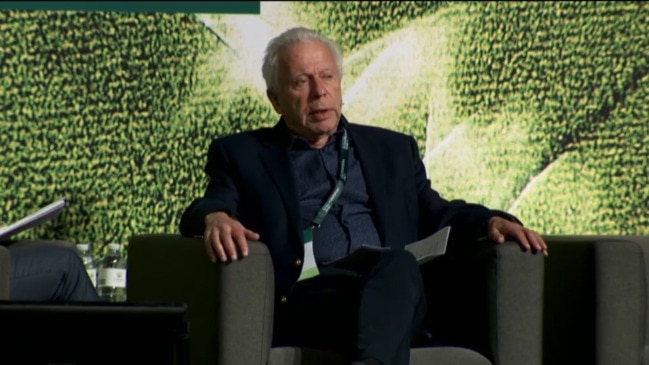China has ‘less love’ for Australia: Chemist Warehouse’s Jack Gance
The chairman of Chemist Warehouse says China’s love affair for Australian products has waned since Covid-19 and the recovery in the relationship has been slow.

Chemist Warehouse chairman and co-founder Jack Gance says China’s love affair for Australian products is waning, despite a thawing of relations between Beijing and Canberra.
Mr Gance, who oversees a business with $8bn annual sales, said Covid-19 lockdowns, trade disruptions, no Chinese tourists and students coming to Australia and government policy have all combined to hurt Australia’s reputation with Chinese consumers.
“It’s like if you’ve been separated from your loved one for two years. I think it takes a while to warm up to them again. And then sometimes you’ve got someone else that you’re in love with,” the billionaire told The Australian’s Global Food Forum in Melbourne on Thursday.
Australian products from beef and barley to wine and lobster have been hit with tariffs from China after former prime minister Scott Morrison spearheaded a push for an inquiry into the origins of Covid-19 three years ago, cruelling a key market for many Australian exporters.
But while the tide has begun to slowly turn after the Albanese government was elected last year, Mr Gance said there was a growing preference for Chinese consumers to buy local goods and products instead of imported goods from countries like Australia and New Zealand.
“The Chinese government very clearly says don’t buy Australian or New Zealand product, buy Chinese products,” he told the Global Food Forum audience.
“For many years, the Chinese would say anything that has Chinese writing on it, they won’t buy. But I think there has been a change in attitude. The government has a big influence on people’s thinking and the way they act, so I wouldn’t underestimate that.”
Chemist Warehouse opened its first of what are now seven stores in China in 2019 and Mr Gance said sales were improving now Covid-19 lockdowns had ended. His business also has strong online sales on the Alibaba website, and Mr Gance said the Chinese daigou or reseller market had been worth $200-$300m in annual sales for Chemist Warehouse.
“When the Chinese had this great relationship and love of Australian products, we could have sold anything to China at any price,” he said. “It is recovering. [But] we sort of feel that it is a little tougher than it has been and there’s a little less love there than it used to be.”
Chemist Warehouse now has about $8bn annual revenue across 600 retail stores and employs almost 20,000 people.

Mr Gance’s family and the Verrocchi family of his business partner Mario Verrocchi have long rumoured to be working on an ASX float for the business in what has been mooted as a potential $5bn transaction.
“If it’s only $5bn we are not doing it,” Mr Gance quipped when asked about the rumoured float price. I have dinner every week with a different banker, and it is great, it means I can have a lot of dinners.”
“For us an IPO or something like that would be for succession planning for the family, and we’ve got 240 partners that are in partnership with our franchisor. For us, we are looking for long-term stability and some sort of liquidity, but we are not in a hurry to get to the table and the [IPO] market is terrible at the moment.”
Adviser Rothschild has previously reportedly sent invites to investment banks to pitch proposals, with Macquarie Capital later reported to have also been involved in any potential Chemist Warehouse IPO.

Mr Gance also revealed Chemist Warehouse sells about $1bn of vitamins each year, made by brands such as Swisse and Blackmores, in a market of about $1.6bn.
“The reason is because our Vitamins really work. I have spinal stenosis, and before I started taking glucosamine I had really bad pains down my legs, but now I don’t. A lot of people don’t believe in vitamins. That’s why people say that vitamins are expensive urine.
“But in fact, the reality is that everything that’s sold as Vitamins has gone through the TGA (Therapeutic Goods Administration) approval process. You can’t say anything about the effectiveness of the product without being backed by scientific evidence.”
Mr Gance also told The Australian that he feared that “2500 pharmacists out of about 25000 will go underwater” when 60-day dispensing is introduced.
The federal government in April announced it would move to introduce 60-day dispensing from September, acting on a recommendation from the Pharmaceutical Benefits Advisory Committee first put forward in 2018.
Under the change, patients will be able to get a two-month supply of medicine for the price of one PBS co-payment.
“It makes it really hard. I know that they want to save money for the consumer, but they can’t do it by taking it off the pharmacist and putting them out of the business.”








To join the conversation, please log in. Don't have an account? Register
Join the conversation, you are commenting as Logout